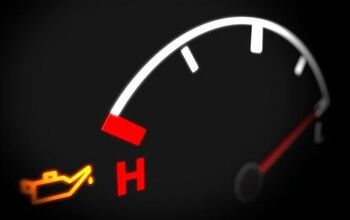Piston Slap: The Low Oil Pressure Safety Net?

TTAC Commentator r129 writes:
Hello Sajeev,
My 2012 Impala with 20,000 miles was due for an oil change, something that I was too lazy to do myself, especially in winter weather. I know, I should know better. I went to a reputable quick oil change establishment (if such a thing exists) that uses name-brand dexos1 approved oil. Everything went as expected, until I drove away. Just after I pulled out of the parking lot, the “Low Oil Pressure – Turn Engine Off” warning light came on. Before I managed to safely pull over, the engine stalled out, and I coasted into a parking spot. There were no unusual noises before the car stalled. We are talking a time span of maybe 30 seconds after leaving the parking lot, and a distance of less than a block.
Damn! This is the kind of thing that happens to people on the internet, not to me!
I walked back to the place, told them what happened, and I noticed a trail of oil leading out of the garage door where I exited. They filled up a container of oil, grabbed some items, and we walked to my car. After poking around, they told me that the filter was defective (it looked like someone had punched a hole in it with a screwdriver), but I’ll never know if they just punched a hole in it to cover up some other cause. They replaced the filter, filled up the engine with oil, and tried to start the car a couple of times. Nothing. It didn’t even try to turn over, just a “click” sound. We walked back to the shop, and at this point, I’m thinking that the oil change place is going to be paying to replace my engine. I waited while they called the store manager. I was assured that they would tow my car, any repairs would be covered in full, even if I needed a new engine, and they would provide a rental car.
But wait! The manager suggested trying one more thing. Disconnect the battery, wait 5 minutes, and try starting the car again. The rationale was that maybe the engine had shut itself down into some sort of “safe mode,” and needed to be “reset.” I was skeptical, but we walked back to the car, tried it, and it cranked up. The engine sounded normal, and I drove it back to the shop. They drained the oil, refilled it to the proper specs, checked the OBD codes, and proclaimed that the car was “okay.” I was given a copy of an incident report that was filled out detailing what happened, credited for the cost of the oil change, and sent on my way. I argued that the car should be checked out by a third party to be sure that there is no damage. The manager told me that if there was anything wrong with the car, they would be responsible for the repairs, but if nothing was wrong, they probably wouldn’t pick up the cost of having it checked out. At this point, I just wanted to get out of there after nearly 2 hours, so I left. Everything seemed normal on the drive home, but after scouring the internet for advice, I think I’m supposed to be scared.
Is there any type of safety net that takes effect to prevent serious damage to the engine in the case of a sudden loss of oil? I don’t know enough about it, and Google is not giving me any good answers. If not, why did the engine start up the second time? How worried should I be? Most importantly, should I have the car checked out, and if so, what should be checked? Any advice is appreciated.
Sajeev answers:
Engine computers are a beautiful thing: they “listen to sensors” and are programmed to make decisions based upon sensor’s inputs. Even small engines do this cool trick.
That said, you should’ve insisted on a tow back to their shop: disconnecting the battery to clear the system defeats this safety measure, which could cause more engine wear, if not engine damage. But it sounds like you are fine, just don’t do that again.
Your Impala is one of the many modern vehicles that turns off the engine when the computer reads troubling information from the oil pressure sensor. And it’s a sensor (detailed information), not a switch (good/bad pressure) like the bad old days of idiot lights. So the computer can notice a significant drop in oil pressure in seconds, cut power to the fuel pump and save the engine (and the car, as it depreciates) to drive another day.
I’m looking for a catchy name for this “low oil pressure engine shut down” technology, but googled nothing. Rest assured, you lost some (not all) of your oil pressure and the system saved you from serious damage. Don’t worry about it. Perhaps next time personally check the oil level before leaving their shop, if that makes you feel better!
What say you, Best and Brightest?
[Image: Shutterstock user ninefotostudio]
Send your queries to sajeev@thetruthaboutcars.com. Spare no details and ask for a speedy resolution if you’re in a hurry…but be realistic, and use your make/model specific forums instead of TTAC for more timely advice.

More by Sajeev Mehta
Latest Car Reviews
Read moreLatest Product Reviews
Read moreRecent Comments
- Jeff “So, the majority of our products are either ICE vehicles or intended to utilize those multi-energy platforms that we have. This is a great opportunity for us, compared to our peers, having the multi-energy platforms for all of our products in development and having the agility to move between them,” she said. From what is stated about the next generation Charger it will be released as a 2 door EV and then as a 4 door with the Hurricane turbo straight 6. I assume both the 2 door and 4 door is on the same platform.
- Brendan Duddy soon we'll see lawyers advertising big payout$ after getting injured by a 'rogue' vehicle
- Zerofoo @VoGhost - The earth is in a 12,000 year long warming cycle. Before that most of North America was covered by a glacier 2 miles thick in some places. Where did that glacier go? Industrial CO2 emissions didn't cause the melt. Climate change frauds have done a masterful job correlating .04% of our atmosphere with a 12,000 year warming trend and then blaming human industrial activity for something that long predates those human activities. Human caused climate change is a lie.
- Probert They already have hybrids, but these won't ever be them as they are built on the modular E-GMP skateboard.
- Justin You guys still looking for that sportbak? I just saw one on the Facebook marketplace in Arizona


































Comments
Join the conversation
I could be wrong, or late to the party, but a friend's 1974 Vega (in 1976 or so)stalled on the freeway. Nearest walk to a service station was fruitful. Guy said to check the oil level. Turned out to be the fuel pump was disabled because of low oil pressure. Probably not the car model you wanted to run the oil low, but who knew that then? Restarted and ran fine. Rusted out before the engine expired. I bet the patent was on the books waiting for electric fuel pumps.
Years ago a buddy of mine had a 1990ish Blazer that was in the neighbor's garage waiting to get some rust spots fixed. He figured while it was sitting there he'd head over and change the oil so once the bodywork was done it'd be ready to drive. We went over one night, ran the engine for a bit to warm up the oil, changed it, then started it up and ran it for a while to circulate the fresh oil. As we walked out we noticed the full tray of oil bottles sitting there. We'd completely forgotten to fill it back up and had run it for a good five minutes with zero oil in it. Although that piece of crap had plenty of other problems (the glovebox light came on when you hit the horn; the headlights blew a 40 amp fuse once a month) the engine ran fine for years afterwards.